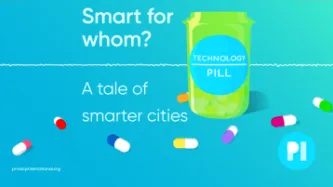Search
Content type: Examples
After a two year investigation into credit referencing agencies (CRAs) Experian, Equifax and TransUnion - initiated in part pursuant to a complaint filed by PI against Equifax and Experian in November 2018 - the ICO has published a report finding "widespread and systemic data protection failings" in the data broking sector. Pursuant to its investigation, the ICO issued an enforcement notice against Experian, requesting the company to achieve compliance with data…
Content type: Frequently Asked Questions
On 27 October 2020, the UK Information Commissioner's Office (ICO) issued a report into three credit reference agencies (CRAs) - Experian, Equifax and TransUnion - which also operate as data brokers for direct marketing purposes.
After our initial reaction, below we answer some of the main questions regarding this report.
Content type: News & Analysis
Privacy International (PI) welcomes today's report from the UK Information Commissioner's Office (ICO) into three credit reference agencies (CRAs) which also operate as data brokers for direct marketing purposes. As a result, the ICO has ordered the credit reference agency Experian to make fundamental changes to how it handles people's personal data within its offline direct marketing services.
It is a long overdue enforcement action against Experian.…
Content type: Video
Dr. Andrea Swartzendruber is the principal investigator for the Pregnancy Resource Center Evaluation at Emory University's Center for Reproductive Health Research in the Southeast. She is an assistant professor in the Department of Epidemiology and Biostatistics at the University of Georgia College of Public Health and an adjunct professor at Emory University Rollins School of Public Health. She has recently published and presented research findings on pregnancy resource centers (also known…
Content type: Long Read
Content type: Case Study
Sebastián Gómez is a land rights defender. He is based in Colombia.
Qn: Please briefly describe your work and the issues/topics you work on.
I am researcher for an organisation working on topics related to the defense of the territory and environmental protection. We operate in different regions, including those which have been historically subjected to violence due to the armed conflict and which are now experiencing a spike in a range of environmental conflicts. Our work consists of…
Content type: Case Study
amaBhungane is an independent, non-profit newsroom based in South Africa. amaBhungane plays a key role in exposing corruption, promoting transparency and accountability at all levels of government. In recent years, amaBhungane has been at the forefront of privacy litigation in amaBhungane Centre and Sole Stephen v. Minister of Justice and Correctional Services and others, a challenge to South Africa’s expansive surveillance laws.
Qn: Please briefly describe your work and the issues/…
Content type: Case Study
Ananda Badudu is an activist, musician and former journalist. In September 2019, he started a crowdfunding campaign page to support student protesters taking part in demonstrations against the Indonesian House of Representatives.
Qn: Please briefly describe your work and the issues/topics you work on.
I’ve been full-time musician for 2 years. Before that I was a journalist from 2010 to 2016, first at Tempo, then at Vice. In late September 2019, I took part in a crowd-funding campaign…
Content type: Case Study
Centro Prodh is a non-profit civil association which promotes human rights, and has been involved in some of the most emblematic cases in Mexico. The impact of their work is only matched by the severity of surveillance threats they face. In his end-of-mission statement after a visit to Mexico, the former Special Rapporteur on the situation of human rights defenders expressed specific concern about Centro Prodh in light of its being targeted for its work on enforced disappearances,…
Content type: Video
Find out more:
About PI's work on smart cities here: https://privacyinternational.org/learn/smart-cities
About Ellie's work here: https://www.urbaninnovationandpolicy.net/ellie-cosgrave
About Lakshmi's work here: https://aru.ac.uk/people/lakshmi-priya-rajendran
And Rob's work here: http://www.kitchin.org/
And you can support PI's work here: support.privacyinternational.org
Content type: Examples
In early August, when the UK government announced it was purchasing 90-minute saliva-based COVID-19 tests called LamPORE and 5,000 lab-free machines to process them, supplied by DNANudge, clinical researchers were dismayed to find that there is no publicly available data about the accuracy or performance of these tests. While the tests could be a game-changer by offering rapid, on-the-spot testing with less discomfort for patients, no scientific research was offered to validate the tests, not…
Content type: Examples
Questions have been raised about an irregular process by which the Trump administration awarded a $10.2 million dollar six-month contract to Pittsburgh-based TeleTracking Technologies. TeleTracking has traditionally sold software to help hospitals track patient status; under the new contract it is collecting key data about COVID-19 from US hospitals, bypassing the Centers for Disease Control and Prevention, to which such data is normally reported. The contract was awarded by the Department of…
Content type: Examples
A growing number of companies - for example, San Mateo start-up Camio and AI startup Actuate, which uses machine learning to identify objects and events in surveillance footage - are repositioning themselves as providers of AI software that can track workplace compliance with covid safety rules such as social distancing and wearing masks. Amazon developed its own social distancing tracking technology for internal use in its warehouses and other buildings, and is offering it as a free tool to…
Content type: Examples
Professional sports teams are considering adopting facial recognition admissions systems to make stadiums as touchless for fans as possible as part of efforts to provide a safe environment during the pandemic. Both the Los Angeles Football Club and the New York Mets are trying the Clear app, made by Alclear, and Major League Baseball is considering it. At the LAFC, fans will use the app to take and upload a selfie to their accounts and link it to their Ticketmaster profiles; on entry to the…
Content type: Examples
The algorithm and mathematical model used to predict students’ grades by the International Baccalaureate programme, which was forced to cancel exams because of the pandemic, incorporated three elements: coursework, teachers’ predictions of their students’ exam grades, and “school context”, which was based on historical teacher grade predictions (which universities use for provisional acceptances) and the school’s historical performance on each subject’s coursework. The result was to penalise…
Content type: Examples
As part of efforts to make returning to campus safer, US universities are considering or implementing mandates requiring students to install exposure notification apps, quarantine enforcement programs, and other unproven new technologies, risking exacerbating existing inequalities in access to both technology and education. In some cases, such as Indiana University, UMass Amherst, and the University of New Hampshire, universities are requiring students to make a blanket commitment to install…
Content type: Examples
A preliminary study finds that facial recognition algorithms struggle to identify people wearing masks. The study tested 89 commercial facial recognition algorithms, and the best had error rates between 5% and 50% in matching unmasked photos with photos of the same person wearing a digitally-applied mask. Masks both lowered the algorithms’ accuracy rates and raised the number of failures to process. The more of the nose is covered by the mask the lower the algorithm’s accuracy; however, error…
Content type: Examples
Manchester-based VST Enterprises is developing a rapid COVID-19 testing kit intended to help restart stadium sporting events. The results of tests, which fans will take the day before the event they wish to attend and provide results within ten minutes, will be stored in VSTE’s V-Health Passport, a secure mobile phone app into which users enter their name, address, date of birth, phone number, and doctor information, plus a scanned official identity document against which the smartphone can…
Content type: Examples
By mid-July, the UK’s contact tracing system was still failing to contact thousands of people in areas with England’s highest infection rates. In London, with the sixth-highest infection rate in England, only 47% of at-risk people were contacted; in partially locked-down Leicester, the rate was 65%. The govt’s SAGE committee has said that 80% of infected people’s contacts just be contacted and told to self-isolate within 48 to 72 hours for the programme to be effective. Local councils are…
Content type: Examples
A gap in government guidance means that thousands of legal migrant key workers could be forced to choose between following new public health laws and destitution, according to Labour MPs and charities.
They are warning that no recourse to public funds (NRPF) conditions, which apply to roughly 1.4 million legal non-EEA migrants in the UK, could exclude thousands from the government’s new Test and Trace support programme, including many key workers.
They say the rules call into…
Content type: Examples
The Home Office moved dozens of asylum seekers involved in a Covid outbreak more than 120 miles despite an enforcement order saying they should remain in self-isolation for 14 days, the Guardian has learned.
Home Office contractors have been accused of being “beyond reckless” in their handling of the initial outbreak.
Among those who were moved despite the instruction to self-isolate, at least nine people were found to have Covid following testing, although the Home Office had initially said…
Content type: Examples
Migrants seeking asylum in Britain could be processed offshore under plans being developed by Priti Patel. Officials have ruled out Ascension Island and St Helena as impractical because of their distance from the UK but the Home Secretary is still seeking a third country where asylum seekers could be held while their applications are processed.
Sources close to Ms Patel countered criticism of the proposal by citing similar plans by Tony Blair when he faced a surge in illegal migrants crossing…
Content type: Examples
Thousands of asylum seekers currently accommodated in hotels are facing removal from the UK, the Home Office has announced.
A letter from the Home Office, seen by the Independent, states that evictions of refused asylum seekers will take place “with immediate effect” and charities have reported an increase in people being held in immigration detention centres.
Source: https://www.theguardian.com/uk-news/2020/sep/19/home-office-plans-to-evict-thousands-of-refused-asylum-seekers
Writer: Diane…
Content type: Examples
By late June, two months after its launch, Australia’s A$1.5 million CovidSafe app had failed to help authorities identify even a single contact of a confirmed case. In the states of Victoria, New South Wales, South Australia, and Tasmania the app had not picked up any contacts that had not already been identified by human contact tracers, and in Western Australia and Queensland no confirmed cases had downloaded the app. In Victoria, where the virus has been spreading, only just over 30 of 568…
Content type: Examples
By the end of its first three weeks of availability, the French contact tracing app, “StopCovid”, had seen 1.9 million downloads. Of these, only 68 people had entered a positive COVID-19 test result, and only 14 were notified that they might have been exposed, according to the French junior minister for digital affairs, Cédric O. He attributed the app’s uninstallation by 460,000 people to a “decline in concern” about the epidemic in France.
https://www.politico.eu/article/french-contact-…
Content type: Examples
In late May, Florida fired Rebekah Jones, its geographic information system manager and architect of the state’s COVID-19 data and surveillance dashboard. The dashboard was praised on TV two weeks earlier by Deborah Birx, the coronavirus response coordinator for the White House Coronavirus Task Force for its accessibility and transparency. A spokeswoman for Florida governor Ron DeSantis blamed Jones’s firing on “insubordination”. A week before, across the state line in Atlanta, Georgia, the…
Content type: Examples
Lovelace Women’s Hospital in Albuquerque, New Mexico, the only medical institution in the state dedicated to women’s health, operated a secret policy of separating First Nation mothers, whom they identified either by appearance or by residence in a particular zip code, from their newborn babies as a “preventative measure” against spreading COVID-19. Normally, the hospital gave expectant mothers temperature checks and asked questions about whether they had been in contact with an infected person…
Content type: Examples
Los Angeles Airport (LAX) has begun the first of two six-week voluntary trials in which travellers walk past fever-detecting cameras before reaching security. Those who show a temperature above 100.4F will be taken aside for secondary screening. During the pilot no one will be stopped from travelling, although airlines may do their own temperature screening and can stop feverish travellers from flying. The goal of the pilot is to test the technology’s accuracy and capability, and is using three…
Content type: Examples
The UK government has instructed bars, restaurants, hairdressers, and churches to record visitors’ contact details when they begin to reopen on July 4 so they can be contacted later if necessary for contact tracing and testing. However, the industry was given no guidance on how to take care of the potentially sensitive data. The ICO said it would monitor developments and assess the data protection implications. Experience in other countries has shown there are risks of abuse by staff.
Source:…







